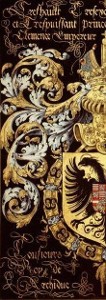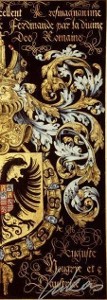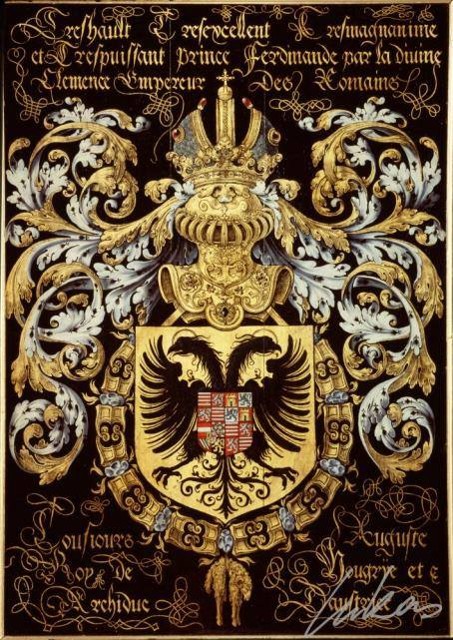


Imperial Household of the Holy Roman Emperor
The emperor was entitled to have a Household, a real one as well as one
"for show" composed of the High Offices of the Empire (Erzämter,
archiofficia). The four High Offices appear under the Ottonian dynasty:
at the coronation of Otto I in 936, each of the Stammherzöge held
one of the functions. The Golden Bull of 1356 assigned them to the lay electors
(in fact, some
electors may have become so because they were High Officers).
After a new
electorate was created for the count Palatine, a new office of Arch-Treasurer
was created for him, in 1652. In 1706, after Bavaria was banned, the elector
palatine resumed his office of Arch-Steward, and the office of Arch-Treasurer
passed in 1710 to the newly created elector of Hanover. In 1714, Bavaria
was reinstated, and the elector palatine resumed the office of Treasurer,
but Hanover continued to use the title and augmentation of arms until the
merger of the Bavarian and Palatine electorates in 1777 allowed Hanover
to exercise the office. New offices were planned but never chosen for the
electors created in 1803.
| Officers of the Empire |
Erzamt |
Holder |
Augment. |
| High Chancelor of Germany |
Erzkanzler durch Germanien |
Mainz |
(none) |
| High Chancelor in Italy |
Erzkanzler durch Italien |
Cologne |
(none) |
| High Chancelor in Gaul and Arles (or Burgundy) |
Erzkanzler durch Gallien und Arelat (Burgund) |
Trier |
(none) |
| Grand Cup-bearer (Butler) |
Erzschenk |
Bohemia |
- |
| High Steward |
Erztruchseß |
Palatinate (to 1623, 1706-14)
Bavaria (1623-1706, from 1714) |
gules an orb or |
| Grand Marshal |
Erzmarschall |
Saxony |
per fess sable and argent, two swords per saltire gules |
| High Chamberlain |
Erzkämmerer |
Brandenburg |
Azure a scepter per pale or |
| High Treasurer |
Erzschatzmeister |
Palatinate (1648-1706, 1714-77)
Hanover (1710-14, from 1777) |
gules plain/gules the crown of
Charlemagne or |
In the exercise of these functions outside of the coronations,
the lay electors were represented by the holders of corresponding
hereditary
offices (Erbämter), and some were themselves represented
in everyday activities by holders of hereditary offices (Hofämter:
Obrist-Hofmeister, Obrist-Kämmerer, Obrist-Hofmarschall,
Obrist-Stallmeister).
The hereditary lands of Austria (Upper and Lower Austria, Styria, Carinthia,
Krain, Tirol, Salzburg, Bohemia) each had their own hereditary officers
of the household as well: in the following table, the names of the officer-holders
for Austria and their heraldic augmentation, if known, are listed as well. The corresponding offices in the French
Royal household were distinguished by external ornaments rather than
augmentations to the coat of arms.
Hereditary Offices
of the Household (Erbämte) |
Imperial |
Austrian |
| English |
German |
French |
Latin |
Holder |
Augment. |
Holder |
Augment. |
| Butler |
Mundschenk |
bouteiller-échanson |
buticularius |
Limburg (to 1714), Althann |
cup or en surtout |
Barth v. Barthenheim |
azure a covered cup or |
| Steward |
Truchseß |
sénéchal |
dapifer |
Waldburg |
gules an orb or |
Schönborn-Buchheim |
ermine an imperial orb oron a cushion gules fringed of
the second |
| Chamberlain |
Kämmerer |
chambellan |
camerarius |
Hohenzollern |
gules two scepters per saltire or |
Lamberg |
|
| Marshal |
Marschall |
maréchal |
|
Pappenheim |
per fess sable and argent, two swords per saltire gules |
Starhemberg |
|
| Treasurer |
Schatzmeister |
trésorier |
aerarius |
Sinzendorf |
gules plain/gules the crown of
Charlemagne or |
--- |
|
| Other offices (Reichsämte) |
| Standard-Bearer |
Bannerherr |
|
|
Württemberg |
azure the Imperial banner in bend proper |
|
|
| Postmaster |
Postmeister |
|
|
Taxis |
|
|
|
| Usher |
Erbtürhüter |
capitaine de la porte |
|
Werthern |
sable a stick in bend sinister or, two leaves issuant
in chief and one in base |
Chotek |
|
| Master of the Hounds |
Jägermeister |
veneur |
|
Urach |
or a bugle-horn gules garnished argent stringed azure |
Lamberg |
|
| Master of the Horses |
Stallmeister |
palefrenier |
equorum magister |
Schwarzburg, Leutenberg |
or a pitchfork and beneath a horsecomb both fesseways
gules |
Harrach |
|
| |
Teichmeister |
|
|
Oldenburg |
|
|
|
| |
Fischmeister |
|
|
Wernigerode |
|
|
|
| |
Feuerherr & Schwertträger |
|
|
Lorraine |
|
|
|
| Falconer |
Falkenmeister |
fauconnier |
|
|
|
Thürheim |
|
| |
|
|
protovestiarius |
Geldern |
|
|
|
| |
Hofmeister |
grand maître |
praefectus aulae |
Bayern |
|
Ungnad-Weißenwolff |
|
| |
Küchenmeister |
queux |
|
|
|
Stiebar |
|
| |
Panier |
panetier |
|
|
|
Abensperg und Traun |
|
| |
Stäbelmeister |
|
magister stabuli |
|
|
Fuchs |
|
| |
Vorschneider |
écuyer-tranchant |
|
|
|
Althann |
|













